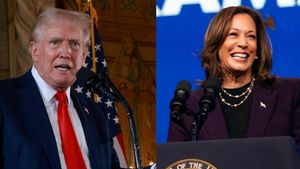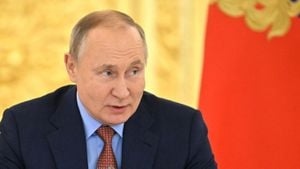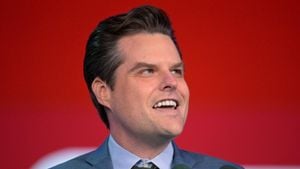Washington, D.C. - President-elect Donald Trump’s decision on selecting his Treasury Secretary carries considerable weight beyond just the name on the currency. The choice is expected to offer significant insights on how he may approach tariffs during his upcoming administration. With the economy being central to Trump’s campaign, this selection process is under close scrutiny.
The process began to draw attention when two prominent candidates surfaced: Howard Lutnick, head of Cantor Fitzgerald, and Scott Bessent, founder of Key Square Capital Management. Lutnick has been actively involved with Trump’s transition team, leading those discussions closely, but recent reports suggest things may not be straightforward. Sources close to the situation reveal Lutnick’s presence has begun to annoy Trump, who fears Lutnick might be steering the transition for his own interests. The rivalry between him and Bessent has been likened to 'a knife fight,' highlighting the intensity of their competition.
Despite initial expectations for Lutnick to secure the role, the dynamic appears to shift as Trump contemplates additional candidates. One name making rounds is Mark Rowan, CEO of Apollo Global Management, who is scheduled to meet with Trump soon. Rowan brings significant financial acumen to the table as the founder of one of the world's largest private equity firms.
Another potential contender is Kevin Warsh, who previously served as a governor of the Federal Reserve. Trump's deliberations indicate he seeks someone with strong economic credentials to navigate both domestic fiscal policy and international trade relations. Core issues like managing interest rates and supporting local manufacturing over foreign industries have been outlined as expectations for the ideal candidate.
The crux of this Treasury Secretary role may hinge on the nominee's stance on tariffs, which Trump has touted as pivotal for American businesses. Notably, Trump advisor Corey Lewandowski emphasized the need for someone who will prioritize revamping the economy, stating, "Someone who understands how to make sure our country and our economy is moving again, making sure we don’t have high interest rates..." Such statements underline how tariffs are being framed as instrumental to economic recovery.
Meanwhile, Trump’s previous trade advisor, Robert Lighthizer, known for his hardline tariff approach, seems to have fallen out of favor for this role because Trump is wary of how the market might react to someone so openly combative.
Trump’s deliberations showcase the dual pressures of wanting to reinforce his populist economic policies, akin to those seen during his first presidency, and ensuring harmony with the current stock market climate, which has reacted positively following his election victory.
While Lutnick is favored for his evident support of tariffs, Trump’s cooling feelings toward him complicate matters. It looks like the decision may hinge on how these candidates position themselves within Trump’s broader economic philosophy, which combines fiscal conservatism with populist ideals. Trump’s logic seems rooted deeply in appealing to both his base and financial elites on Wall Street.
This indecisiveness has starkly contrasted Trump's swift action on other Cabinet posts; with such rapid movements elsewhere, it raises questions about why the Treasury pick is being treated with heightened caution. The president-elect is acutely aware of the importance of his Treasury appointment to retain both economic stability and his populist agenda.
The reflections of Trump and advisors on the candidates paint the picture of someone who is seeking to balance formidable economic influence, wealth, and clear support for tariff-based policies, which may turn out to be the linchpin of his entire administration's economic strategy moving forward.
Trump's decision on Treasury Secretary is anticipated to form the backbone of his economic policy and, by extension, the future of American trade under his leadership. If he selects someone like Lutnick or Warsh, it could signal not only who holds influence over American currency but also the direction tariffs will take, which may deepen the divisions between protective measures and free trade.



